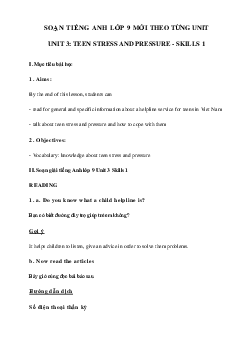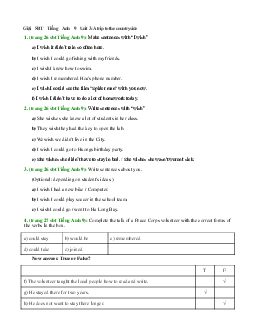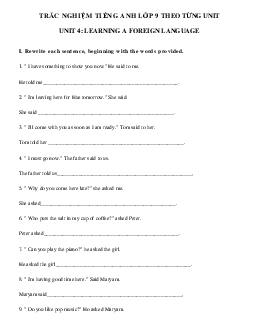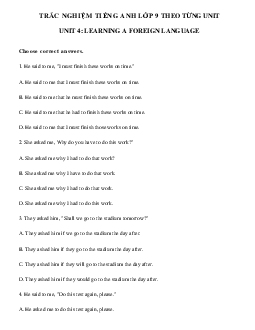














Preview text:
A. Phonetics - trang 19 - Unit 2 – Sách bài tập(SBT) tiếng Anh 9 mới
1. Practise saying these sentences, paying attention to how the verb forms of be are pronounced.
Luyện tập nói những câu sau, chú ý làm thế nào để phát âm động từ be.
1. - Aren't you interested in taking this course?
- I am. But I'm not sure when to take it.
2. Minh Duc is interested in playing football, but Hoang Thu isn't
3. Do you think they are coming?
- Yes, they are coming. Don't worry. 4. - Are you tired? - Yes, I am.
5. -Aren't you taking the bus? It's very far to walk.
- Yes, I am taking the bus. When is the next one coming?
2.Look at the verb form of be in bold in each pair of sentences. Which one should be stressed? Tick Yes
or No and then practise saying both of them.
Nhìn vào dạng của động từ be trong mỗi cặp câu dưới đây. Từ nào cần đánh trọng âm? Tích Có hoặc
Không rồi luyện nói tất cả các từ. Yes No 1.
A. is it important for teenagers to learn life skills?
B. Isn't it important for teenagers to learn life skills? 1. A. He was frustrated. 2. - Was he frustrated? -Yes, he was. 1.
A. - Isn't swimming your favourite sport?
- Yes, swimming is my favourite sport, but today the water is too cold for me.
- Swimming is my favourite sport. Key - Đáp án: Yes No 1.
A. is it important for teenagers to learn life skills? ü x
B. Isn't it important for teenagers to learn life skills? 1. A. He was frustrated. ü X 2. - Was he frustrated? - Yes, he was. 1.
A. - Isn't swimming your favourite sport? ü x
- Yes, swimming ]s my favourite sport, but today the water is too cold for me.
- Swimming is my favourite sport.
3. Underlined the verb forms of be which should be stressed in the following sentences. Then practise saying them.
Gạch chân dạng của động từ be cái cần đánh trọng âm trong những câu dưới đây. Rồi luyện tập nói.
1. He wasn't depressed. He was just a bit worried.
2. Isn't this painting beautiful?
3. - Are you going to the supermarket now?
- Yes, I am. Do you need something
4. - I thought he wasn't good at cooking.
- Oh yes, he is. He can cook almost anything. 5. - Is it raining?
- No, it isn't. We can go now. Key - Đáp án:
1. He wasn't depressed. He was just a bit worried.
2. Isn't this painting beautiful?
3. - Are you going to the supermarket now?
- Yes, I am. Do you need something
4. - I thought he wasn't good at cooking.
- Oh yes, he is. He can cook almost anything. 5. - Is it raining?
- No, it isn't. We can go now.
B. Vocabulary& Grammar-trang 20-Unit 3-Sách bài tập (SBT) tiếng anh lớp 9 mới
1.Choose the word that DOES NOT fit in the sentences.
Chọn từ KHÔNG phù hợp với những câu sau.
1. You may feel____ before taking an important exam.
(tense/stressed/surprised/worried)
2. You have finished your exam, and you think you did well. You may feel____
(relaxed/depressed/calm/confident).
3. You have a problem with your classmates at school and you don't know who to talk to. You may
feel________ (worried/delighted/stressed/depressed)
4. You are asked to fix a broken bicycle chain and you are not sure what to do. You may feel______ .
(confused/frustrated/happy/embarrassed)
5. You have moved to a new school and you know nobody there. You may feel____.
(depressed/left-out/delighted/stressed)
6. You notice something strange happening to your body when you start your adolescence. You may feel______ .
(embarrassed/confused/left-out/ worried) Key - Đáp án: 1. surprised 2. depressed 3. delighted 4. happy 5. delighted 6. left-out
2.Match the verbs in A to the nouns in B
Nối những động từ ở cột A với danh từ ở cột B. A B 1. Make a) Support 1. Resolve b) Healthy habits 1. Overcome c) risks 1. Take d) Informed decisions 1. Ask for e) Conflicts 1. form f) Stress Key - Đáp án: 1.d; 2.e; 3.f; 4.c; 5.a; 6.b
3.Use the phrases created in 2 to complete the following sentences.
Sử dụng những cụm từ ở bài 2 để hoàn thành những câu sau.
1. Recognising your feelings is a way to_________.
2. Our teacher said we should ______such as sleeping at least eight hours a night and exercising regularly.
3. ‘I'm fighting with my sister again! It feels like we can never____________________ our_________ !"
4. ‘Don't act too quickly! You should consider both the good points and bad points in order
to_________!’ my father advised me.
5. He is a very wise man. He knows when to_______and when to wait.
6. 'When you are in trouble, who do you__________________?' asked the survey. Key - Đáp án:
1. overcome stress 2. form healthy habits
3. resolve - conflicts 4. make informed decisions
5. take risks 6. ask for support
4. Match the skill to the example.
Nối những kĩ năng với những ví dụ sau. Key - Đáp án:
1. b,i; 2. d,g; 3. a,f; 4. c,h; 5. e,j
5. Turn the following statements into indirect/reported speech.
Chuyển những câu sau thành câu gián tiếp/câu trần thuật.
1. 'Have you seen her recently?’ asked Thanh.
2. 'Last night I couldn't sleep!’ she said.
3. 'I am on my way,’ he said.
4. 'We want to send our son to a university in the UK,’ they said
5. 'Have you ever tried calling a helpline?’ the teacher asked Ngoc
6. 'Tell Emma I miss her very much,’ she told me. Key - Đáp án:
1. Thanh asked me if I had seen her recently.
2. She told me she couldn't sleep the night before. 3. He said he was on his way.
4. They said they wanted to send their son to a university in the UK.
5. The teacher asked Ngoc if she had ever tried calling a helpline.
6. She told me to tell Emma she missed her very much.
6. Turn the following sentences into direct speech.
Chuyển những câu sau thành câu trực tiếp.
1. He advised me to visit the company's website.
2. They said he hadn't come to the meeting.
3. She asked if I wanted to become a doctor.
4. They said the support service would be set up in December.
5. My mother said she had sent me the book the week before.
6. He asked if it was too late to apply for the course. Key - Đáp án:
1. 'You should visit the company's website,’ he told me.
2. 'He didn't come to the meeting,’ they said.
3. 'Do you want to become a doctor?’ she asked me.
4. 'The support service will be set up in December,’ they said.
5. 'I sent you the book last week,’ my mother told me.
6. 'Is it too late to apply for the course?’ he asked.
7. Rewrite the following sentences using question words before to-ìninitives.
Viết lại những câu sau có sử dụng từ để hỏi trước to-V.
1. 'When should I start the computer?’ Nguyen asked his teacher.
—> Nguyen asked_________________________________________ •
2. I don't really know what I should say in my graduation speech. Can you help me?
—► I don't really know , Can you help me?
3. They can't decide what they should do in this situation.
—►They can't decide ____________________________________________ .
4. 'Should I tell this to her?’ he asked himself.
—► He wondered ______________________________________________ .
5. She was not sure who she should contact.
—» She was not sure_______________________________________ .
6. 'Where can I find more information about this?’ he asked.
—► He didn't know_______________________________________ . Key - Đáp án:
1. Nguyen asked his teacher when to start the computer.
2. I don't really know what to say in my graduation speech. Can you help me?
3. They can't decide what to do in this situation.
4. He wondered whether to tell that to her.
5. She was not sure who to contact.
6. He didn't know where to find more information about that.
C. Speaking - trang 23 - Unit 3 - Sách bài tập (SBT) tiếng anh 9 mới
1.Take a piece of paper and write down three sentences that your teacher or classmates said to you today.
Then relay these sentences to your family members, using reported speech.
Lấy một mảnh giấy và viết ba câu mà giáo viên hoặc bạn cùng lớp đã nói với bạn hôm nay. Sau đó
nói những câu này với các thành viên trong gia đình bạn, sử dụng câu trần thuật.
2.Here are some skills from 3, VOCABULARY&GRAMMAR. Answer these questions, using your own experience.
Đây là một số kĩ năng từ bài 3, phần VOCABULARY&GRAMMAR. Trả lời những câu hỏi dưới đây,
theo kinh nghiệm của bạn.
1. Have you ever overcome stress? How did you do it?
2. Have you got any healthy habits? What are they?
3. Have you ever resolved any conflicts? How did you do that?
3.Imagine that you are in a difficult situation where some of your classmates force you to do their
homework for them. What wil you do? Why do you choose to do that?
Tưởng tượng bạn đang trong tình huống khó xử là bạn cùng lớp của bạn bắt bạn phải làm bài tập về nhà
giúp họ. Bạn sẽ làm gì? Tại sao bạn làm thế?
a. Do what your classmate have asked, and tell nobody about it.
b. Refuse to do what they have asked, and tell nobody about it.
c. Talk to your teacher or your parents about it.
D.Reading-trang 23-Unit 3- Sách bài tập (SBT) tiếng anh lớp 9 mới
1.Read the following text about Bill Gates, the co-founder of Microsoft, and do the tasks below.
Đọc văn bản sau nói về Bill Gates, người sáng lập ra Microsoft, và làm bài tập dưới đây.
Bill Gates is the co-founder of Microsoft, the world's largest PC software company. He is among the
richest people in the world. Bill Gates' interest in computers started when he was a teenager. After high
school, he was accepted to several top colleges in the USA: Harvard, Yale, and Princeton. He chose to
go to Harvard to study law. At Harvard, he focused more on his interest in computers than on
coursework. He often relaxed by playing video games in Harvard's computer lab. He left Harvard before
graduating because he wanted to open a software company with his friend Paul Allen. However, he later
said, "I don’t think dropping out is a good idea.’ In 2007, he received an honorary degree from Harvard.
He began his speech by saying this to his father in the audience. "I have been waiting more than 30 years
to say this: Dad, I always told you I'd come back and get my degree.’ Bill Gates is no longer working
full time for Microsoft. He is now, with his wife, running The Bill & Melinda Gates Foundation which
aims to improve healthcare, reduce poverty, and promote education around the world. a. Choose the best answer.
1. When did Bill Gates first develop his interest in computers? A. during his teenage years B. when he went to university
C. when he was at nursery school
2. What did he study at Harvard University? A. computer science B. business C. law
3. What did he often do to relax while at Harvard? A. play sports B. play video games C. go to parties
4. Why did he drop out of Harvard? A. because he was ill
B. because he wanted to study at another university
C. because he wanted to start a software company
5. What did he receive from Harvard in 2007? A. an honorary degree B. a job C. a company
6. What is the purpose of The Bill & Melinda Gates Foundation? A. law
B. healthcare, poverty reduction, and education C. computer software Key - Đáp án:
1. A; 2. C; 3. B; 4. C; 5. A; 6. B
b.Decide if the following statements are true (T) or false (F).
Đánh dấu nếu những câu sau đúng (T) hoặc sai (F). T F 1.
After high school, Gates was accepted to only middle-ranking colleges in the USA. 1.
At Harvard, he focused more on his coursework than his interest in computers. 1.
He didn't know how to relax after his hard work. 1.
He regretted that he had dropped out of Harvard. 1.
He had always wanted to get his degree from Harvard. 1.
He wanted to make his father happy by getting his degree. Key - Đáp án:
1. F (He was accepted to several top colleges in the USA)
2. F (He focused more on computers)
3. F (He played video games to relax) 4. T 5. T 6. T
c. Rewrite these sentences in indirect speech.
Viết lại những câu sau về câu gián tiếp.
1. I don't think dropping out is a good idea,’ said Bill Gates.
2. I always told you I'd come back and get my degree,’ he said to his father. Key - Đáp án:
1. Bill Gates said he didn't think dropping out was a good idea.
2. He told his father that he always said he would come back and get his degree.
2.Read this text about ways to manage your anger, then do the tasks that follow.
Đọc văn bản dưới đây nói về cách thức để chế ngự sự tức giận của bạn, sau đó làm bài tập dưới đây. Tips to control anger
It is normal to be angry sometimes, but if you let your anger get out of control, it can lead to problems.
Here are some simple tips to control this feeling. Relax
- Take deep breaths to make you calm down.
- Repeat slowly some calming words such as 'relax’ or 'take it easy’. Think positively
- When things go wrong and make you angry, say to yourself: 'this is not the end of the world’.
- Remind yourself that getting angry won’t solve anything, and won't make you feel better. Solve the problem
- Instead of feeling angry, try to solve the problem, but remind yourself that it's okay if the solution doesn't work. a. Choose the best answer.
1. It's normal/not normal to be angry.
2. You should/shouldn't let your anger get out of control.
3. Anger can/can't be controlled,
4. Relaxing is/isn't a good way to manage your anger.
5. When feeling angry, try to think positively/negatively.
6. Don't try/ Try to solve the problem that makes you feel angry. Key - Đáp án: 1. normal 2. shouldn't 3. can 4. is 5. positively 6. Try
b.Complete the following sentences with the words or phrases from the text.
Hoàn thành những câu sau với từ và cụm từ từ văn bản trên.
1. Take_____ breaths to make you calm down.
2. Repeating words or phrases such as______ or_______ might help.
3. Tell yourself if things go wrong.
4. Feeling angry is not going to______ and make you ____ .
5. Remind yourself it's okay if the solution you tried. Key - Đáp án:
1. deep 2. 'relax’; 'take it easy’ 3. 'this is not the end of the world’
4. solve things; feel better 5. doesn't work
3. Read the text below about useful tips when you are studying for tests, then do the tasks that follow.
Đọc văn bản sau về những mẹo hữu ích khi bạn ôn thi, sau đó làm bài tập dưới đây. Studying for a test
1. Create your own study aids: make an outline of the main ideas, or a timeline of important events.
2. Don't wait until the last minute to study! Have short daily study sessions.
3. Read the test instructions carefully.
4. Read the entire test through before starting.
5. Read the teacher's feedback on your test carefully, and try to learn from your mistakes.
6. Answer the easiest questions first, then the ones with highest point value.
7. If you aren't sure hơ to answer a question fully, try to at least answer part of it.
8. Save the test for later review.
9. Save time at the end of the test to look over your work.
10. Be sure to find out ahead of time the areas the test will cover, and the format of the test.
a Match the underlined words/phrases in the text to their meanings.
Nối những từ/cụm từ gách chân trong văn bản với nghĩa của chúng. 1. comment(s) 2. quickly examine something 3. whole
4. a line that shows the order in which events have happened.
5. before something takes place
6. the way the test questions are presented, e.g. multiple choice or essay 7. study something again Key - Đáp án:
1. feedback 2. look over 3. entire 4. timeline
5. ahead of time 6. format 7. review
b. Put the tips in the appropriate box.
Điền những mẹo vào hộp phù hợp. Key - Đáp án: efore the test When taking the test After the test 1,2,10 3,4,6,7,9 5,8
c. Answer the following questions.
1. What should you find out before taking the test?
2. How can you remember the main ideas or important events?
3. Which types of question should you answer first?
4. What should you do just before the end of the test?
5. What should you do when the test is returned to you? Key - Đáp án:
1. The areas the test will cover, and the format of the test.
2. Make an outline of the main ideas, or a timeline of important events.
3. Answer the easiest questions first, then the ones with highest point value. 4. Look over the work.
5.Keep it for review. Read the teacher's feedback. Learn from the mistakes.
E. Writing - trang 26 - Unit 3 - Sách bài tập (SBT) tiếng Anh 9 mới
1. Rewrite the ideas in 3, READING, in the form of advice. Use the phrases for giving advice you have learnt in this unit.
Viết lại các ý trong mục 3 - đọc hiểu theo dạng câu khuyên bảo. Sử dụng các cụm từ đã được học trong bài này. Example: Create your own study aids.
—► I think you should create your own study aids ...
It might help to create your own study aids ...
Have you thought about creating your own study aids...
2. Match the following pieces of advice to the situations in 1, VOCABULARY & GRAMMAR.
Nối các ý sau với các câu khuyên bảo ở bài 1 mục Từ vựng và ngữ pháp.
A. It might help if you try to be open and friendly first. This will make it easier to make newfriencs
B. Have you thought about asking someone to show you how to fix it?
C. The change is normal, but if you are worried, it might help to call a helpline.
D. I think you should relax now. You've done very well in the exam.
E. It might be, a good idea to find out about the format of the exam in advance.
F. If I were you, I would talk to the teacher about this problem. Key - Đáp án:
1. A-5; B-4; C-6; D-2; E-1; F-3
3. Now look again at the situations in 1, VOCABULARY & GRAMMAR. This time give your advice for each problem.
Nhìn vào bài 1 mục Từ vựng và ngữ pháp, đưa ra lời khuyên của bạn cho mỗi vấn đề.



